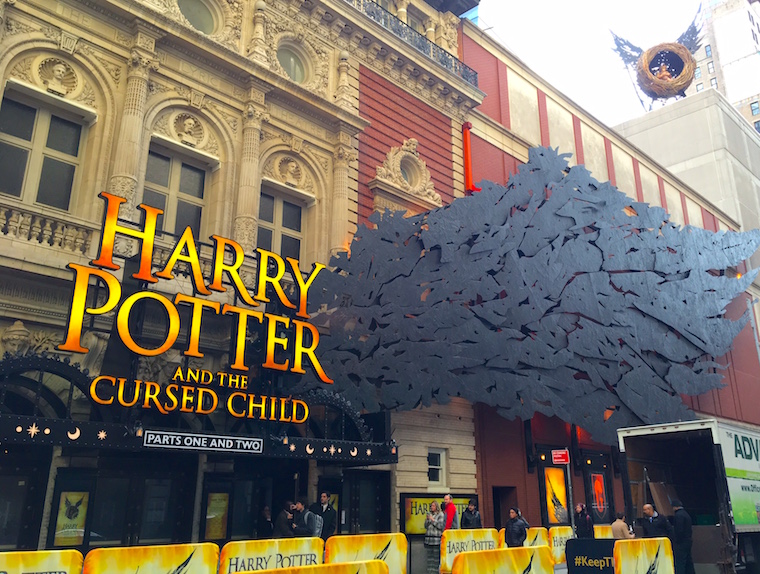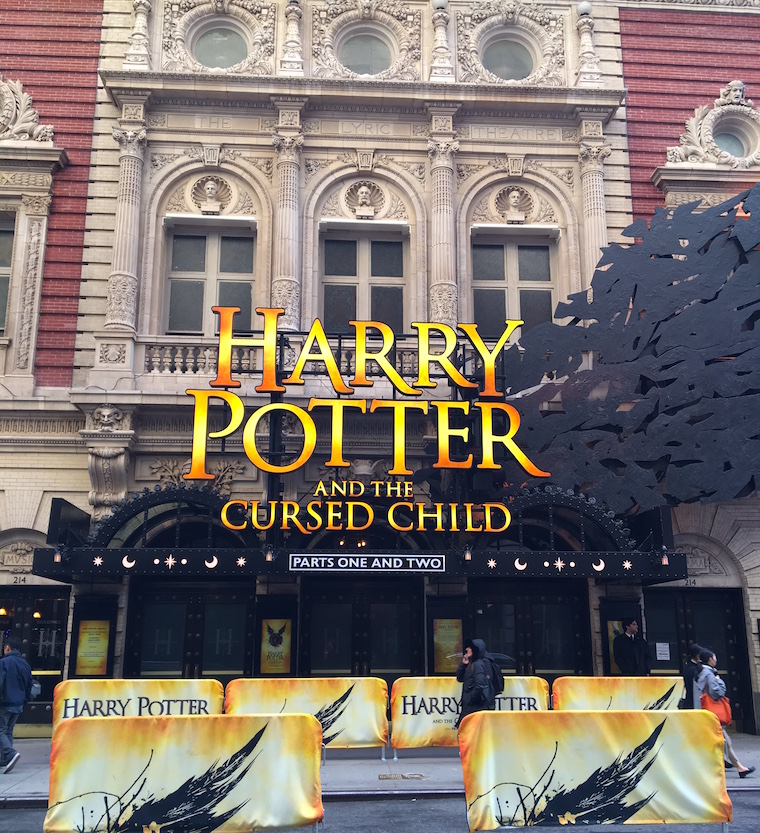Lyric Theatre, 214 West 43rd Street
Outside the theatre, the black abstract rendering of a large wing hovers over the line of attendees waiting to get in a full hour before the performance is set to begin (as instructed by a voluminous collection of e-mail messages). We make our way through the metal detectors and security in excited and orderly fashion, and even the numerous people in capes and witch-and-wizard-inspired wardrobe don’t cause much of a hold-up. Inside the newly-renovated Lyric Theatre, everything is Harry Potter, right down to the red carpet which is emblazoned with a royal ‘H’ design; the interior wall-paper is festooned with the same ‘H’ pattern, and clearly someone is banking on this two-part play being around for some time.
With all the magic that this experience is bringing to Broadway, the main ‘M’ word that strikes me throughout the two-night event is ‘money’. It’s there in the HP details that run throughout the theater, in the little concession stands that offer all sorts of cute libations (at about $16 a pop) and the little store that offers food stuff and merchandise (t-shirts go for $30 and sweatshirts start at $60). Money is the main thing on my mind as I sat through the first night of the magical experience. The bottom line of it, for me, was the nagging notion that this could have, and perhaps should have, been done in one big three-hour show. There’s something very Dark-Lordish about forcing parents to buy two nights of entertainment (as if anyone is going to see one or the other). That automatically doubles the profit. And if you are lucky enough to get face-value tickets for the orchestra, two people seeing both nights will run you approximately $811.50 with all requisite fees and taxes. I don’t know what that is in galleons, but it’s a lot.

As for the plays themselves, if you love Harry Potter you will love this experience, and may even wish for a third night of magic. If you don’t love HP, or if you’ve never read the books or seen the films, you will likely be extremely confused and possibly even unmoved or unimpressed by what’s happening on stage. More than any other theatrical event I’ve been to, this one relies on an audience’s knowledge and understanding of the wizarding world that was conjured so memorably in the novels. The program goes some way toward clearing up that bit for the rare audience member who has shelled out all that money without knowing anything about HP, but even I, avid reader of Playbills, lost interest by the recap of Year Five and the glossary entry of ‘Patil, Padma & Parvati’. If you have to supply that much background information for the newcomer to enjoy the show, you’ve already lost. That’s wholly beside the point here, as I happen to love Harry Potter, and the people seeing the show seemed to love him far more than me. But if you think you can go in and enjoy this production without knowing anything about its storied past, you may be sorry.
Billed as picking up the Harry Potter saga nineteen years after the last book was completed, J.K Rowling, Jack Thorne and John Tiffany wrote the new work in traditional play format. As such, it is very true to its source material, and for a world starved for anything new in the Harry Potter canon, it made for a quick read. It’s less of a quick play, and to answer whether it really needed two parts, I’d argue no. If they took out the flashy flourishing of capes alone and the unnecessary transitional bits, they’d shave off half an hour instantly. A slightly repetitive beginning, reminiscent of the way most of the Potter books opened with a chapter of two of dreary Dursley recapitulation, extends things unnecessarily. And I strongly contend that there is one narrative thread too many, but these issues aside, the play’s magic is undeniable. That’s in no small part due to the impeccable cast.
Casting the grown-up versions of Harry, Hermione Granger, Ron Weasley and Draco Malfoy as almost-forty-something parents is risky work, but each choice pays off solidly. As the iconic title character, Jamie Parker delivers the requisite angst and agitations of a father coming to terms with his child and his childhood at the same time. Noma Dumezweni brings a commandeering presence to her Hermione Granger, and there is delicious pay-off in seeing this beloved character in her current Ministry position. As Ron Weasley, Paul Thornely gets some of the night’s biggest laughs, who perceptively describes himself as the least ‘intense’ of the lot. Alex Price nails the duality of Draco Malfoy, himself struggling with a son who may or may not live up to expectations. As their children Albus Potter and Scorpius Malfoy, two youngsters match the emotional high-bar set by their parental counterpoints: Sam Clemmett and Anthony Boyle. Clemmett shines darkly as the son of Harry Potter, an impossible-to-live-up-to position, while Boyle sets the stage on fire with comedic flair and endearing dorkiness. The two of them set the real plot in motion for this clock-turning two-evening journey through time. The themes are familiar and universal: parental love, childhood loneliness, and the enduring sustenance of friendship, and whenever the play returns to these core pillars, the cast is able to shine (most of whom remain intact from the London world premiere).
The magic of the beloved books is brought to remarkable life thanks to some amazing special effects. Hermione’s library comes alive, swallowing several characters whole. Dementors take fearsome flight, and the time-turning sequences are spectacular. The stagecraft wizardry is a magnificent wonder, almost worth the price of admission alone, and the way they execute the magic is a seamless feat of how-did-they-do-that jaw-dropping wonder. Yet none of that matters if you can’t touch the heart. The time-honored crux of where parents and children meet is here, marred and scarred by love and loss, touched and tinged by sadness and elation, and each emotion gets its center-stage turn. By the end it’s a mish-mash of emotional ‘murkiness’, which is both good and bad for a play of this scope and size. I maintain that a streamlined version could more effectively crest such emotional waves, and a more focused concentration on delivering the quiet, impactful moments might better serve its emotional arc, but that might be too picky. Sometimes, the spectacle is enough, and a return to this magical world should more than satisfy anyone who misses the enchantment that Rowling conjured for so many summers.


